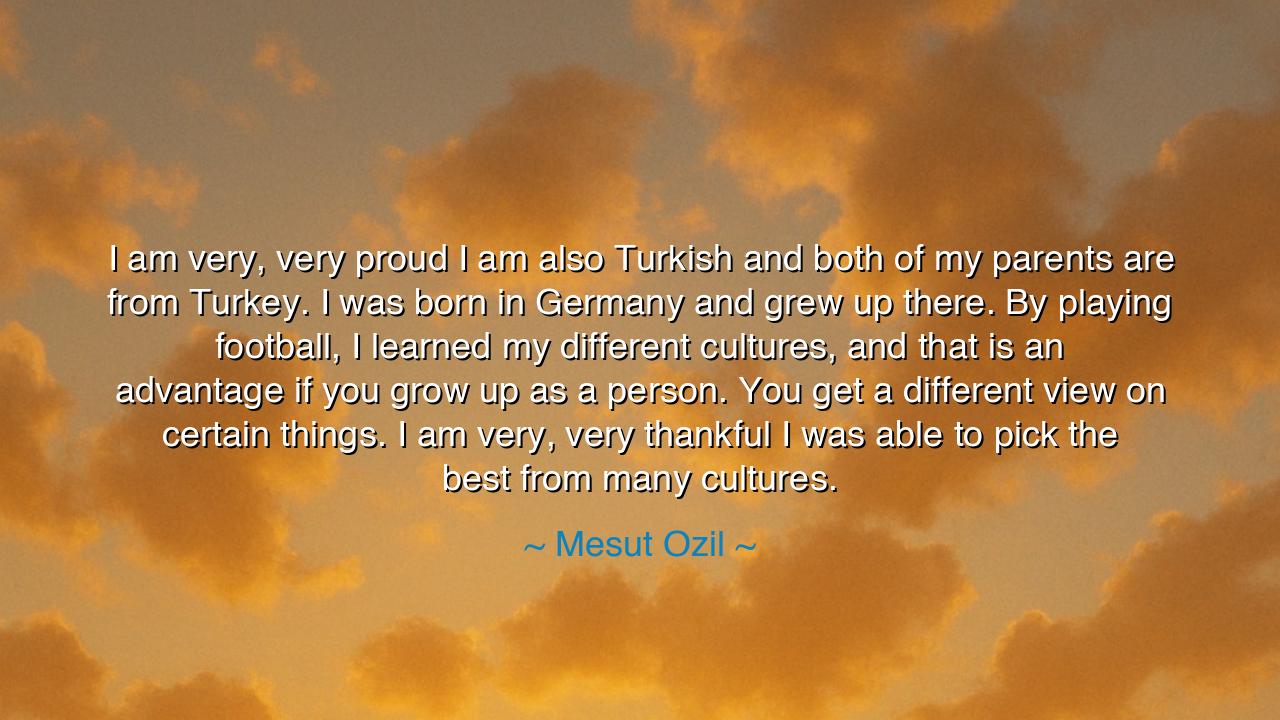
I am very, very proud I am also Turkish and both of my parents
I am very, very proud I am also Turkish and both of my parents are from Turkey. I was born in Germany and grew up there. By playing football, I learned my different cultures, and that is an advantage if you grow up as a person. You get a different view on certain things. I am very, very thankful I was able to pick the best from many cultures.






The words of Mesut Özil, a man of Turkish heritage yet born and raised in Germany, are the words of one who has walked the bridge between two great rivers of tradition. His declaration speaks to the ancient truth that identity is not bound by the soil of one land alone, but by the flowing stream of cultures, histories, and values that converge in the life of an individual. He proclaims pride not only in his origins but also in the journey that allowed him to weave the best of both worlds into the fabric of his being. His football, the sacred game that knows no borders, became the arena in which he tested and learned the virtues of diversity.
In this saying, Özil acknowledges the advantage of dwelling between different worlds. Where some might see division, he saw unity. Where others might fear conflict, he embraced growth. By partaking in the spirit of both his parents’ homeland and his birthplace, he came to see the world not through a single narrow lens but through many. Such a gift grants the bearer not only tolerance but also wisdom — the ability to discern the strengths of each way of life and gather them, like pearls, into a greater necklace of identity.
Consider, O listener, the story of Alexander the Great, who, though Macedonian, embraced the customs of Persia, Egypt, and India. He wore the robes of kings from distant lands, respected their traditions, and in doing so, built a vision of empire where East and West intertwined. While his empire did not endure, the memory of his openness to many worlds remains. So too does Özil’s example remind us that to stand with one foot in each culture is not to be torn apart, but to be strengthened by a wider horizon.
The essence of his message is thankfulness. He does not merely bear the weight of multiple identities; he rejoices in them. He sees not confusion, but clarity. He finds not division, but advantage. And in this gratitude lies the lesson: that one who has known the richness of many traditions should not hoard them, but use them to live more wisely, to judge more justly, and to love more broadly.
Yet, the path of the one who belongs to more than one land is not always easy. The child of two worlds is often tested by suspicion, by those who demand purity of blood, tongue, or allegiance. Özil himself knew criticism, at times from those who questioned his loyalty. But he teaches us here that the strength of his identity was forged not by choosing one over the other, but by embracing both. In this, he stands as a shield-bearer for all children of migration, diaspora, and mixed heritage.
What then is the lesson for us, wanderers upon the earth? It is this: do not reject the streams that feed your soul. If you are blessed to draw from more than one source — be it language, tradition, or land — let each give you strength. Gather the virtues of each culture as a gardener gathers flowers from many fields. In your heart, let not division take root, but harmony. For in harmony, the human spirit grows broad like a tree whose roots reach deep into many soils.
Therefore, let all who hear these words practice thankfulness, as Özil did. Do not despise your differences, nor hide the richness of your heritage. Instead, weave them together into a banner of identity that you may carry proudly into the world. When you meet others from lands and traditions not your own, do not fear their differences but ask yourself: what gift might I learn from them? In this way, you too may "pick the best from many cultures" and thus walk with a spirit enlarged, a soul made wise.
So I say to you, children of the present and heirs of the future: cherish your roots, honor your journey, and embrace the diversity of humankind. For every culture is a star in the sky of creation, and the one who learns from many will shine more brightly than the one who clings to only one. This is the teaching of Mesut Özil, and this is the lesson we must pass down: unity in diversity, and gratitude for the many gifts the world offers.






AAdministratorAdministrator
Welcome, honored guests. Please leave a comment, we will respond soon